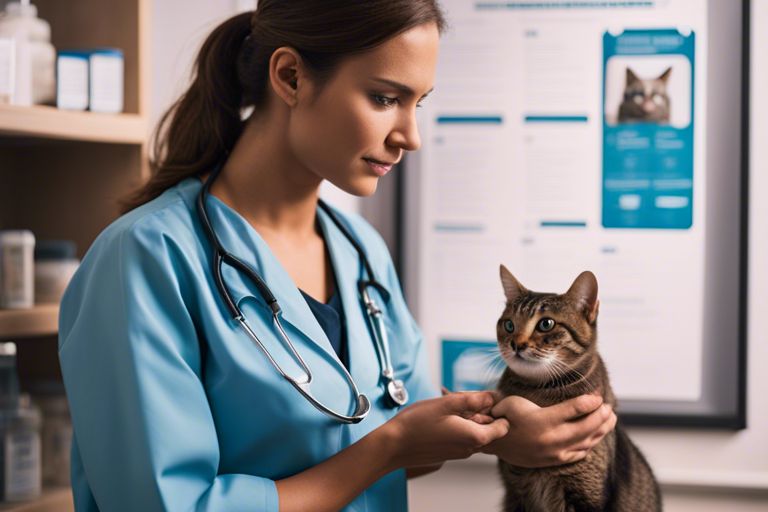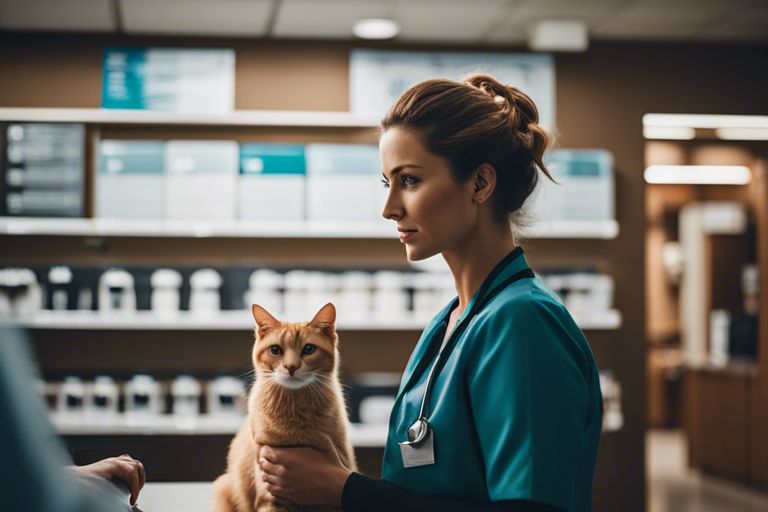Encountering gastrointestinal issues in your feline companion can be a cause for concern. While cats are generally known for their digestive prowess, they are not immune to common gastrointestinal problems that can affect their health. Understanding the signs and symptoms of these issues is crucial for ensuring the well-being of your pet. From hairballs to inflammatory bowel disease, there are several common gastrointestinal problems that can impact cats of all ages. In this informative blog post, we’ll explore the dangers of each of these issues, as well as the positive steps you can take to address them and keep your feline friend healthy.
Key Takeaways:
- Diarrhea and vomiting: These are the most common gastrointestinal problems in cats, and can be caused by various factors such as dietary indiscretion, infections, parasites, or underlying health conditions.
- Constipation: Cats can suffer from constipation due to inadequate fiber or water intake, hairballs, or underlying medical issues such as megacolon.
- Inflammatory bowel disease (IBD): This chronic condition can cause vomiting, diarrhea, weight loss, and other gastrointestinal symptoms in cats, and often requires a long-term management plan.
- Pancreatitis: Inflammation of the pancreas can lead to digestive disturbances, abdominal pain, and other symptoms in cats, and prompt veterinary attention is essential for proper management.
- Intestinal parasites: Worms, such as roundworms, tapeworms, and hookworms, are common gastrointestinal issues in cats and can cause diarrhea, vomiting, weight loss, and other health problems.

Common Gastrointestinal Problems in Cats
The gastrointestinal system of your cat can be prone to a variety of health issues. It’s important to be aware of the most common gastrointestinal problems in cats so that you can recognize the symptoms and seek appropriate care for your feline friend. In this blog post, we’ll explore some of the typical gastrointestinal problems that cats may experience, as well as their symptoms and potential treatment options. For more detailed information on cat digestive problems, you can also read our article on Cat Digestive Problems: Symptoms, Diagnosis, and Treatment.
Hairballs (Trichobezoars)
One of the most common gastrointestinal issues in cats is the formation of hairballs, or trichobezoars. When your cat grooms itself, it ingests loose hairs, which can accumulate in the stomach and form into hairballs. Symptoms of hairballs in cats may include vomiting, decreased appetite, and constipation. Regular grooming and a high-fiber diet can help prevent hairball formation in your cat. If your cat is experiencing chronic problems with hairballs, it’s important to consult with your veterinarian to determine the best course of action.
Inflammatory Bowel Disease (IBD)
Inflammatory bowel disease (IBD) is another common gastrointestinal problem in cats. It is a chronic condition characterized by inflammation of the digestive tract. If your cat is experiencing symptoms such as chronic diarrhea, vomiting, and weight loss, it could be a sign of IBD. Your veterinarian can diagnose IBD through various tests and may recommend dietary changes, medication, or other treatments to manage the condition and improve your cat’s quality of life.
Infectious Gastroenteritis
Infectious gastroenteritis is caused by a viral, bacterial, or parasitic infection of the digestive system. Common symptoms of gastroenteritis in cats include diarrhea, vomiting, and abdominal pain. If you notice these symptoms in your cat, it’s important to seek veterinary care promptly to prevent dehydration and further complications. Treatment for infectious gastroenteritis may involve medication, fluid therapy, and supportive care to help your cat recover.
Parasitic Infections
Parasitic infections, such as roundworms, hookworms, and giardia, can also affect your cat’s gastrointestinal health. These parasites can cause symptoms such as diarrhea, weight loss, and a dull coat. Regular deworming and preventative measures can help protect your cat from these common parasites. If you suspect that your cat has a parasitic infection, it’s important to consult with your veterinarian for appropriate diagnosis and treatment.
Constipation and Megacolon
Constipation and megacolon are gastrointestinal problems that can cause discomfort and distress for your cat. Constipation is characterized by infrequent or difficult bowel movements, while megacolon refers to the enlargement of the colon due to chronic constipation. If your cat is experiencing constipation, it’s essential to address the underlying cause and provide relief through dietary changes, hydration, and, in some cases, medication. If left untreated, chronic constipation can lead to megacolon, a more severe condition that may require medical intervention.
Symptoms and Diagnosis
Despite your best efforts to keep your cat healthy, they may still experience gastrointestinal problems at some point in their life. It’s important to recognize the signs of gastrointestinal distress and seek an accurate diagnosis to ensure your feline friend receives the proper treatment.
Recognizing the Signs of Gastrointestinal Distress
When it comes to gastrointestinal problems in cats, being able to recognize the signs of distress is crucial. Keep an eye out for symptoms such as vomiting, diarrhea, constipation, loss of appetite, weight loss, lethargy, dehydration, and abdominal pain. If you notice any of these signs in your cat, it’s essential to seek veterinary attention as soon as possible. Gastrointestinal issues can escalate quickly, so early recognition is key to successful treatment.
Procedures for an Accurate Diagnosis
When you take your cat to the vet for gastrointestinal issues, there are several procedures that may be used to make an accurate diagnosis. Your vet may start by conducting a physical examination and taking a thorough history of your cat’s symptoms. They may also recommend diagnostic tests such as blood work, fecal analysis, imaging studies (X-rays, ultrasounds), and endoscopy to get a better understanding of your cat’s condition. The results of these tests will help your vet determine the underlying cause of your cat’s gastrointestinal problems and develop an appropriate treatment plan.
Treatment and Management
To effectively manage gastrointestinal problems in your cat, it’s important to work closely with your veterinarian to develop a treatment plan that addresses your cat’s specific needs. Treatment and management may involve medical interventions, dietary considerations, and long-term management of chronic conditions.
Medical Interventions
If your cat is experiencing severe gastrointestinal issues, your veterinarian may recommend medical interventions such as medication to reduce inflammation, antibiotics to treat bacterial infections, or even surgery in certain cases. It’s crucial to follow your veterinarian’s guidance and administer any prescribed medications as directed. Failure to do so could lead to worsening of the condition and potential complications.
Dietary Considerations
Adjusting your cat’s diet can play a significant role in managing gastrointestinal problems. Your veterinarian may recommend a special prescription diet formulated to be easily digestible or to address specific gastrointestinal issues. It’s important to follow your veterinarian’s guidance when it comes to feeding your cat, as certain foods or ingredients may exacerbate gastrointestinal symptoms. Additionally, ensuring your cat has access to clean, fresh water at all times is crucial for overall gastrointestinal health.
Long-term Management of Chronic Conditions
If your cat has been diagnosed with a chronic gastrointestinal condition such as inflammatory bowel disease or pancreatitis, long-term management will be necessary. This may involve ongoing medication, regular check-ups with your veterinarian, and potential adjustments to your cat’s diet or lifestyle. It’s important to closely monitor your cat’s condition and report any changes or concerns to your veterinarian promptly. With proper long-term management, many cats with chronic gastrointestinal conditions can lead happy, comfortable lives.
Prevention and Care
Now that you are familiar with the most common gastrointestinal problems in cats, it’s essential to understand how you can prevent and care for your feline friend to maintain their gastrointestinal health.
Preventive Measures for Gastrointestinal Health
When it comes to preventing gastrointestinal problems in your cat, diet plays a crucial role. Ensure that you are providing a well-balanced, high-quality diet that is suitable for your cat’s age, size, and health status. Avoid giving them table scraps or human food, as this can disrupt their digestive system. Additionally, make sure your cat has access to fresh water at all times to stay hydrated, which is essential for proper digestion. Regular exercise is also important for your cat’s overall health, including their gastrointestinal system. Encourage playtime and provide stimulating toys to keep them active and engaged.
The Role of Regular Veterinary Check-ups
Regular veterinary check-ups are a crucial part of maintaining your cat’s gastrointestinal health. Your vet can conduct routine examinations and check for any signs of gastrointestinal issues. They can also provide guidance on proper nutrition and care for your cat, as well as administer preventive measures such as deworming and vaccinations. Additionally, your vet can detect any potential problems early on, leading to prompt treatment and better outcomes. Make sure to schedule annual check-ups for your cat to ensure their overall well-being.
By incorporating these preventive measures and ensuring regular veterinary check-ups, you can significantly reduce the risk of gastrointestinal problems in your cat, keeping them healthy and happy for years to come.
Conclusion
Upon reflecting on the most common gastrointestinal problems in cats, it is important to recognize the signs and symptoms of these issues in order to promptly seek veterinary care. From hairballs and dietary indiscretions to more serious conditions such as inflammatory bowel disease and pancreatitis, your feline companion can suffer from a variety of gastrointestinal ailments. By being aware of the potential problems and taking the necessary steps to maintain a healthy digestive system, you can help ensure your cat’s overall well-being and quality of life. Always consult with your veterinarian if you have concerns about your cat’s digestive health, and work together to develop a plan for prevention and treatment.
FAQ
Q: What are the most common gastrointestinal problems in cats?
A: The most common gastrointestinal problems in cats include vomiting, diarrhea, constipation, and inflammatory bowel disease. These issues can be caused by a variety of factors such as dietary indiscretion, parasites, infections, or underlying health conditions.
Q: How can I tell if my cat is experiencing gastrointestinal problems?
A: Symptoms of gastrointestinal problems in cats may include vomiting, diarrhea, changes in appetite, weight loss, lethargy, and abdominal discomfort. If you notice any of these signs, it is important to consult with a veterinarian to determine the underlying cause and appropriate treatment.
Q: What should I do if my cat is experiencing gastrointestinal problems?
A: If your cat is experiencing gastrointestinal problems, it is important to seek veterinary care. Your veterinarian can perform a thorough examination, diagnostic tests, and recommend a treatment plan tailored to your cat’s specific condition. In some cases, dietary changes, medications, or supportive care may be necessary to address the issue effectively.

Jayley, a devoted cat enthusiast, also writer for other cat blog as well. She aims to dedicated to providing comprehensive information, insights, and advice on everything you’d ever want to know about our whiskered companions.
